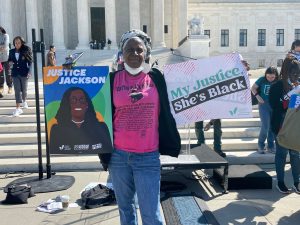By Alex Backus
msn.com
Judge Ketanji Brown Jackson delivered a message of gratitude in her opening remarks Monday, as she shared a strong sense of American patriotism.
“The first of my many blessings is the fact that I was born in this great nation,” she began, citing civil rights acts passed by Congress a few years prior.
“Like so many who had experienced lawful racial segregation firsthand, my parents left their hometown of Miami, Florida and came to Washington D.C., to experience new freedom,” Jackson said. “My parents taught me that unlike the many barriers that they had to face growing up, my path was clearer. So that if I worked hard and I believed in myself in America, I could do anything or be anything I wanted to be.”
Jackson’s parents were at Monday’s hearing, proudly watching their daughter as she delivered her opening remarks before the Senate Judiciary Committee. Jackson said her parents also taught her and her brother, a police officer, the importance of public service.
“One for the ages,” NAACP tweeted. “Many of Judge Jackson’s supporters, including us, call her even-handed and judicious. Her calm demeanor and patient smile that she has exhibited throughout this first day despite some hostile remarks from Senators is a compelling example of her judicial temperament.”

Opening Statement
Judge Ketanji Brown Jackson delivered her opening statement Monday following opening remarks by each member of the Senate Judiciary Committee.
“I am humbled and honored to be here,” Jackson said. “I am also very thankful for the confidence that President Biden has placed in me.”
Monday marked the fourth time Jackson has appeared before the Senate Judiciary Committee. Since her nomination last month, Jackson has met with each Committee member, separately.
Jackson was joined by several members of her family at Monday’s hearing including her father who she credited for her interest in studying law. She also acknowledged her two daughters, Talia (21) and Leila (17), who were at the hearing.
“Girls, I know it has not been easy,” Jackson said about balancing motherhood and a legal career. “I did not always get the balance right, but I hope you’ve seen with hard work, determination and love, it can be done.”
If confirmed, Jackson would replace retiring Justice Stephen Breyer, who Jackson clerked for in 1999.
“I know I could never fill his [Breyer’s] shoes,” Jackson said. “If confirmed, I would hope to carry on his spirit.”
She also spoke about her dedication to remaining independent and fair in her role as a judge.
“If confirmed, I will work productively to support and defend the constitution,” she said. “I have been a judge for nearly a decade now and I take that responsibility and my duty to be independent very seriously. I decide cases from a neutral posture. I evaluate the facts, and I interpret and apply the law to the facts of the case before me, without fear or favor, consistent with my judicial oath. I know my role as a judge is a limited one.”
Judge Thomas Griffith, a former federal judge of the U.S. Court of Appeals for the D.C. Circuit, and University of Pennsylvania Carey Law School professor Lisa Fairfax introduced Jackson. Fairfax and Jackson met in their early college days and became roommates.
“Those first moments when you wonder if you belong… she’s the friend who made sure you did,” Fairfax said.
Nominated By Biden
Judge Ketanji Brown Jackson was nominated by President Joe Biden to serve as a justice on the U.S. Supreme Court in February of 2022.
Jackson has served on the U.S. Court of Appeals for the D.C. Circuit since June of 2021. President Barack Obama nominated Jackson to the U.S. District Court for the District of Columbia in 2012. She also served as a commissioner on the U.S. Sentencing Commission.
Jackson was in private practice before serving as an Assistant Federal Public Defender in Washington, D.C.
The 51-year-old began her legal career with three clerkships, including under Justice Stephen Breyer between 1999 and 2000, who she’s now poised to replace.
Jackson was born in Washington D.C. and raised in Miami, Florida. She earned her law degree from Harvard University. She is married to Patrick Jackson, a surgeon. The two met at Harvard, the Miami Herald reports. The couple has two daughters, Talia (21) and Leila (17).
Senator Josh Hawley raised concerns of Judge Ketanji Brown Jackson’s “lenient” sentencing in child pornography cases during his opening remarks.
Hawley referenced seven cases he believed Jackson’s rulings were too soft on child predators. He has previously called her record on such cases “alarming.”
“What concerns me is that in every case, in each of these seven, Judge Jackson handed down a lenient sentence that was below what the federal guidelines recommended and below what prosecutors requested,” Hawley said Monday. “I think there’s a lot to talk about there.”
Hawley said he raised the concerns now, so Jackson is able to respond in the coming days during questioning.
“Some have asked why did I raise these questions ahead of the hearing, why not wait and spring them on Judge Jackson as it were,” he continued. “My answer to that is very simple: I’m not interested in trapping Judge Jackson, I’m not interesting in trying to play gotcha. I’m interested in her answers.”
“Exceptional Justice”
President Joe Biden said Ketanji Brown Jackson will make an “exceptional justice,” as his nominee to the Supreme Court prepared to deliver her opening statement Monday.
“As Judge Jackson begins her Supreme Court confirmation hearings this week, I look forward to the Senate and country seeing how incredibly qualified she is for the job,” Biden tweeted Monday afternoon. “She’s a brilliant legal mind with the utmost character and integrity. I know she’ll make an exceptional Justice.”
Biden named Jackson as his Supreme Court nominee in February to replace retiring Justice Stephen Breyer.
The Senate Judiciary Committee took a 30 minute lunch break. The committee reconvened just after 2:00 p.m. EST.
Republican Senators serving on the Senate Judiciary Committee continued to condemn Democrats‘ handling of past Supreme Court nomination hearings, during the first day of confirmation hearings for nominee Ketanji Brown Jackson.
Republican Senator Ted Cruz followed Senator Lindsey Graham in slamming behavior during Justice Brett Kavanaugh‘s confirmation hearings in 2018, which he called “one of the lowest moments” in the Senate Judiciary Committee’s history.
“Your hearing will feature none of that disgraceful behavior,” Cruz said to Jackson during his opening remarks. “No one is going to inquire into your teenage dating habits,” referencing to sexual assault allegations against Kavanaugh. [Or ask] “do you like beer.”
Cruz continued to reference Democrats’ handling of previous Supreme Court nominees Clarence Thomas and Robert Bork in 1991 and 1987, respectively. Cruz told Jackson that her hearings will focus on her record and questioning will focus on ascertaining “what kind of justice” she would be.
“It is no longer the case that Supreme Court confirmation hearings are merely about qualifications… our Democratic colleagues have abandoned that standard long ago,” Cruz said.
Supporters of Judge Ketanji Brown Jackson rallied outside of the Supreme Court Monday morning, as confirmation hearings began for the Supreme Court nominee.
“KBJ”
Several women-led groups gathered with signs and “KBJ” letters to express support for President Joe Biden’s pick for the nation’s highest court.
“Excited to join... in celebration of Judge Ketanji Brown Jackson’s historic nomination to SCOTUS!” Let America Vote said. “We’re calling on the Senate to move quickly and without interruption on her confirmation. Throughout her career, Judge Jackson has earned broad, bipartisan support, demonstrating her firm commitment to fairness and equal justice for all.”
The National Women’s Law Center was among the organizations at Monday’s rally. Several speakers explained the historic significance and importance of Jackson’s nomination.
“It is personal when she takes her seat and we get to watch her break that glass ceiling,” National Women’s Law Center President and CEO Fatima Goss Graves said.
A group of Southern University Law Center students also traveled from Baton Rouge, Louisiana to Washington, D.C. for the rally.
Senator Lindsey Graham’s said this week’s confirmation hearings for Supreme Court Justice nominee Ketanji Brown Jackson will not be “like Kavanaugh.”
Graham spent a large portion of his opening remarks Monday referencing the contentious series of hearings for Supreme Court Justice Brett Kavanaugh in 2018. He said Jackson won’t face “constant attack” like Kavanaugh.
“Most of us couldn’t go back to our offices during Kavanaugh without getting spit on,” Graham said. “Hope that doesn’t happen to y’all, I don’t think it will.”
It means… “none of us, I hope, have been sitting on information about you as a person for weeks or months,” Graham said. “You come into our offices and we never share it with you to allow you to give your side of the story. We wait ’til the very last minute when the hearing’s about to be gaveled and concluded and say, ‘oh by the way I got this letter’ and so happened that every media outlet in the country had the letter too.”
“So the next morning, there were headlines all over the country, really, accusing Judge Kavanaugh of being basically Bill Cosby. None of us are going to do that to you. And if any of us does that to you, all hell will break out, and it should.”
Judicial Philosophy
Graham said hearings will be “challenging” and “informative,” focused on Jackson’s judicial philosophy.
“I want to know about your judicial philosophy because people on the left, the far extreme part of the left, believe that you were the best bet,” he said. “And I want to know why they reached that conclusion.”
Monday’s confirmation hearings began with opening remarks from Senate Judiciary Committee Chairman Dick Durbin, who called Monday a “proud day for America.”
“Not a single justice has been a Black woman,” Durbin said, “You, Judge Jackson, can be the first. It’s not easy being the first. Often you have to be the best and in some ways the bravest. Your presence here today… will give inspiration to millions of Americans who see themselves in you.”
In a brief history of the nation’s highest court, Durbin reflected on the nearly 700,000 slaves in the U.S. when the Supreme Court first met in 1790.
“There was no equal justice under the law for the majority of people living in America,” he said. “We have come a long way since 1790.”
Ranking member Senator Chuck Grassley followed Durbin’s remarks, promising a “thorough and exhaustive” examination of Judge Jackson’s record and views.











